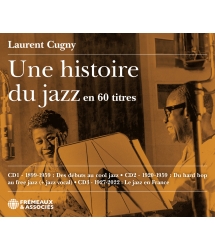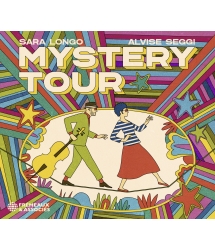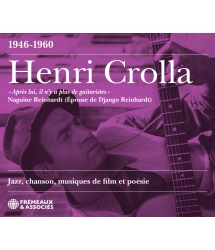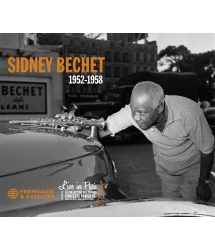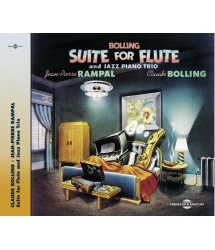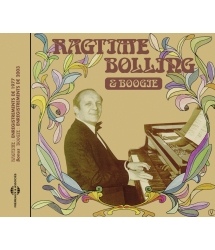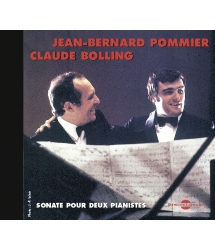- Our Catalog
- Philosophy
- Philosophers of the 20th century and today
- History of Philosophy (PUF)
- Counter-History and Brief Encyclopedia by Michel Onfray
- The philosophical work explained by Luc Ferry
- Ancient thought
- Thinkers of yesterday as seen by the philosophers of today
- Historical philosophical texts interpreted by great actors
- History
- Books (in French)
- Social science
- Historical words
- Audiobooks & Literature
- Our Catalog
- Jazz
- Blues
- Rock - Country - Cajun
- French song
- World music
- Africa
- France
- Québec / Canada
- Hawaï
- West Indies
- Caribbean
- Cuba & Afro-cubain
- Mexico
- South America
- Tango
- Brazil
- Tzigane / Gypsy
- Fado / Portugal
- Flamenco / Spain
- Yiddish / Israel
- China
- Tibet / Nepal
- Asia
- Indian Ocean / Madagascar
- Japan
- Indonesia
- Oceania
- India
- Bangladesh
- USSR / Communist songs
- World music / Miscellaneous
- Classical music
- Composers - Movie Soundtracks
- Sounds of nature
- Our Catalog
- Youth
- Philosophy
- News
- How to order ?
- Receive the catalog
- Manifesto
- Dictionnary











- Our Catalog
- Philosophy
- Philosophers of the 20th century and today
- History of Philosophy (PUF)
- Counter-History and Brief Encyclopedia by Michel Onfray
- The philosophical work explained by Luc Ferry
- Ancient thought
- Thinkers of yesterday as seen by the philosophers of today
- Historical philosophical texts interpreted by great actors
- History
- Books (in French)
- Social science
- Historical words
- Audiobooks & Literature
- Our Catalog
- Jazz
- Blues
- Rock - Country - Cajun
- French song
- World music
- Africa
- France
- Québec / Canada
- Hawaï
- West Indies
- Caribbean
- Cuba & Afro-cubain
- Mexico
- South America
- Tango
- Brazil
- Tzigane / Gypsy
- Fado / Portugal
- Flamenco / Spain
- Yiddish / Israel
- China
- Tibet / Nepal
- Asia
- Indian Ocean / Madagascar
- Japan
- Indonesia
- Oceania
- India
- Bangladesh
- USSR / Communist songs
- World music / Miscellaneous
- Classical music
- Composers - Movie Soundtracks
- Sounds of nature
- Our Catalog
- Youth
- Philosophy
- News
- How to order ?
- Receive the catalog
- Manifesto
- Dictionnary
JEU DOUBLE
Ref.: FA514
Artistic Direction : FRANCK MOSSLER
Label : Frémeaux & Associés
Total duration of the pack : 1 hours 10 minutes
Nbre. CD : 1
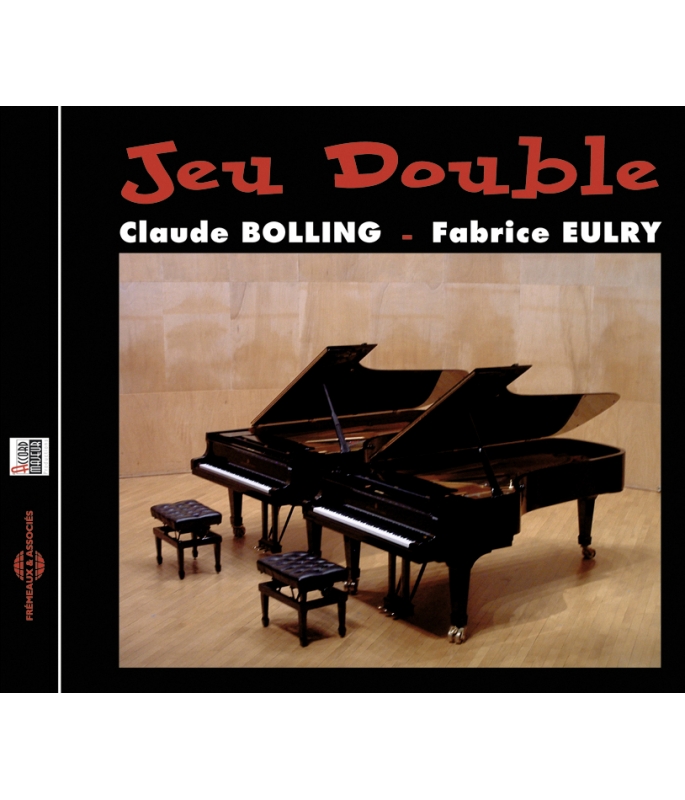
JEU DOUBLE
JEU DOUBLE
“These two exceptional musicians are identical: they're both very demanding; they're absolutely bursting with enthusiasm; and both of them get a bit wary if you treat them like friends too quickly! I wanted to bring them together for a series of concerts at the Salle Cortot, and it was two years before the idea finally took shape. Little by little, the two of them came to trust me… Today the record has finally come out!” Franck Mossler

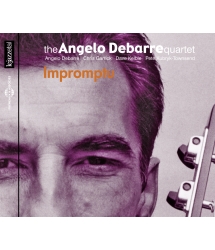
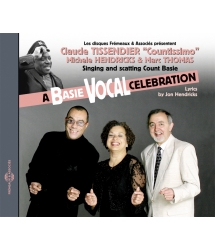
-
PisteTitleMain artistAutorDurationRegistered in
-
1BorsalinoBolling Claude00:06:052004
-
2Westside BoogieBolling Claude00:02:562004
-
3CaravanBolling Claude00:06:422004
-
4Fatty FatsBolling Claude00:04:352004
-
5Sing Sing SingBolling Claude00:07:272004
-
6Pine Top's BoogieBolling Claude00:04:142004
-
7The Man I LoveBolling Claude00:05:192004
-
8YesterdaysBolling Claude00:04:582004
-
9Blue SkiesBolling Claude00:06:282004
-
10Stoptime RagBolling Claude00:03:262004
-
11La Complainte des ApachesBolling Claude00:02:462004
-
12Oh, Lady Be GoodBolling Claude00:10:472004
-
13S.F.P BoogieBolling Claude00:05:062004
Jeu Double
Jeu Double
Claude BOLLING – Fabrice EULRY ?
Discographie
1. BORSALINO (Thème) 6’00
Claude Bolling / Bleu Blanc Rouge Editions ?
2. WESTSIDE BOOGIE, d’après WEST SIDE Story, Fabrice Eulry 2’48
Leonard Bernstein – Stephen Sondheim / Leonard Bernstein Music Publishing Co. ?
3. CARAVAN 6’30
Duke Ellington – Juan Tizol – Irving Berlin / Boosey and Hawkes Music Publishing Ltd ?
4. FATTY FATS 4’16
Claude Bolling / Bleu Blanc Rouge Editions ?
5. SING SING SING 7’20
Louis Prima / Robin Music Corp. ?
6. PINE TOP’S BOOGIE 4’03
Clarence ’Pine Top’ Smith / Melrose Music Inc. ?
7. THE MAN I LOVE 5’08
George & Ira Gershwin / New World Music ?
8. YESTERDAYS 4’48
Jerome Kern – Otto A. Harbach / Harms TB Company ?
9. BLUE SKIES 6’14
Irving Berlin / Irving Berlin Inc.
10. STOPTIME RAG 3’14
G.B. Sponhaltz / Beechwood Music Corp.
11. LA COMPLAINTE DES APACHES (thème de “Les Brigades du Tigre”) 2’32
Claude Bolling – Henri Djian / Pigalle Intersong Editions Musicales
12. OH, LADY BE GOOD 9’42
George & Ira Gershwin / New World Music
13. S.F.P. BOOGIE 4’10
Claude Bolling / Caïd Music
Remerciements à :
Gilles Mery (Vibra’son) – ingénieur du son
Marc-Gilbert Lachin (etagereprod) – montage-mixage
Séverine Croisiard – photographe
Ecole Normale de Musique de Paris / Alfred Cortot
Depuis que je suis en âge de fréquenter les boîtes de Jazz je suis toujours allé écouter Claude sans oser lui parler bien sûr ; sans lui dire que j’avais tous ses disques, sans lui dire que lycéen, j’avais gagné un concours en faisant les claquettes sur un de ses morceaux (Not This Time), sans lui avouer que j’avais commencé à jouer de la batterie en m’entraînant sur ses disques en trio… Bref, j’étais comme l’amateur qui vient faire le “bœuf” dans la chanson de Michel Jonasz ! Quant à Fabrice, je suis allé le voir quatre fois lors de son passage à Bobino ! Je disais à mes amis : “Venez voir Fabrice Eulry car vous n’avez jamais vu ça de votre vie !” Lorsqu’il a établi son record de durée au Petit Journal Montparnasse (24 heures non stop), j’étais près de lui pendant 24 heures. Je ne connais pas de pianiste aussi talentueux alliant technique, sensibilité et un tel sens du show ! Ces deux musiciens d’exception sont identiques : exigeants avec eux-mêmes, bouillonnants d’enthousiasme et méfiants quand on les considère trop vite comme des amis. L’idée de les réunir pour une série de concerts à la Salle Cortot a pris deux ans. Petit à petit tous deux m’ont offert leur confiance et même la grande chance de jouer avec eux deux lors de concerts organisés par André Damon (fondateur du Petit Journal) en Aveyron. Aujourd’hui le disque voit enfin le jour… Je repense au premier soir sur la scène de Cortot quand j’ai présenté le concert. J’étais fier d’être des leurs, fier de les avoir réunis, fier de savoir que le public allait vibrer et fier d’avoir compris qu’ils ne pratiquaient pas avec moi un double jeu, ou plutôt… un Jeu Double ! Keep swinging Claude, Fabrice et… Merci !
Franck Mossler
© 2009 Frémeaux & Associés
A la belle époque d’Age tendre et tête de bois, Albert Raisner avait organisé un duplex musical entre le jeune pianiste classique Jean-Bernard Pommier, qui avait remporté le Prix Tchaïkovski et qui venait d’obtenir le Prix Marguerite Long, et moi. Me piquant à ce jeu inhabituel, j’ai très vite composé une Sonate pour deux pianistes que nous avons créée ensemble au Grand Echiquier de Jacques Chancel, puis que j’ai jouée avec d’autres grands pianistes à travers le monde. Sur ce mode inhabituel (trio jazz et interprète classique, chacun parlant son langage), j’ai ensuite écrit pour la flûte de Jean-Pierre Rampal, la guitare d’Alexandre Lagoya, la trompette de Maurice André… Lorsque Franck Mossler m’a proposé un duo avec Fabrice Eulry, la gageure était autre. Ce marathonien du piano, avec sa fougue et son enthousiasme était le partenaire rêvé pour des dialogues improvisés ou rigoureux, mais toujours surprenants. De plus, je garde une affection toute particulière pour la salle Cortot de l’Ecole Normale de Musique où nous avons enregistré. Cest là que j’ai fait mes débuts à 14 ans, à l’initiative du Hot Club de France qui y organisait ses concerts du dimanche après-midi.
Claude Bolling
© 2009 Frémeaux & Associés
Par sa musique, Claude Bolling est de ceux qui m’ont fait rêver, et fait comprendre que ce rêve n’était pas inaccessible. Je n’ai surmonté les doutes et les obstacles, trouvé le courage d’affronter un travail obsessionnel dont le salaire est avant tout spirituel, et escaladé lentement le mont de grâce du haut duquel je les entends, que guidé par le son de tels maîtres. En 1993, j’osai inviter Claude Bolling à ma “Nuit du ragtime”. Aurions-nous connu cette musique en France sans lui ? Dans la salle bondée, je l’entrevis trois secondes assis sur un escalier, incognito. Puis reçu ses félicitations chaleureuses la semaine suivante. Un an plus tard il m’offrit son parrainage et sa participation gracieuse pour cet évènement qui gagna ainsi en régularité. Cependant le duo ne coulait pas de source ; dans notre métier rien ne va de soi. Il naquit peu à peu par l’initiative d’amis communs : Dédé (André Damon), Coco (Claude Philips), Joël Behuet et Francis Tarpin du Petit-journal, la pianiste et chanteuse Séverine Croisiard, Jean Meyniel du festival de Decazeville et enfin Franck Mossler qui nous a produit à la salle Cortot, réalisant lui aussi son rêve...
Fabrice Eulry
© 2009 Frémeaux & Associés
Borsalino
Version concertante du thème du film culte de Jacques Deray qui a réuni Alain Delon et Jean-Paul Belmondo. Fabrice Eulry y a apporté sa touche personnelle
Westside Boogie, d’après West Side Story
Fantaisie à deux pianos de Fabrice Eulry à partir du thème de cette comédie musicale qui a marqué les années soixante, signée Leonard Bernstein
Caravan
Quelques variations et improvisations sur ce grand classique de Duke Ellington, le maître de Claude Bolling
Fatty Fats
Composition de Claude Bolling, inspirée par le langage pianistique de son autre grand maître du piano, Thomas Fats Waller dont il était influé, principalement à ses débuts.
Sing Sing Sing
Morceau qui a marqué la carrière du clarinettiste – chef d’orchestre Benny Goodman, dans une version personnelle de Fabrice Eulry, rythmé par la pulsation de son pied.
Pine Top’s Boogie
Reprise par Claude Bolling, du grand classique du boogie woogie de Clarence “Pine Top” Smith
The Man I Love
Développement, improvisation et dialogue sur ce thème de George Gershwin qui fut longtemps méconnu jusqu’à sa reprise par Billie Holiday
Yesterdays
Solo de Claude Bolling sur le thème de Jerome Kern, inspiré d’une improvisation d’Art Tatum.
Blue Skies
Fabrice Eulry a créé une véritable composition à partir de ce grand classique d’Irving Berlin
Stoptime Rag
Dialogue à deux pianos sur ce ragtime emblématique de Scott Joplin
Les Brigades du Tigre
Bonne humeur à quatre mains sur le thème de la musique de la série télévisée de Victor Vicas.
Oh, Lady be Good
Dialogue des deux pianos sur le thème des frères Gershwin créé pour un show à Broadway avec Fred Astaire en 1924.
S.F.P. Boogie
Final sur le boogie composé par Claude Bolling pour Jean-Christophe Averty
english notes
I’ve been going to hear Claude Bolling play ever since I was old enough to get into a jazz club. Not that I ever dared to say a word to him of course: I never told him I had all his records, or that when I was in high-school I’d won a competition tap-dancing to a piece of his called Not This Time. Nor did I tell him I used one of his trio records to practise on when I started playing the drums... As for Fabrice, I went to see him four times when he was playing at Bobino... I was saying to friends, “Come and see Fabrice Eulry; you’ve never seen anything like him before!” When he set his endurance record playing twenty-four hours nonstop (at the Petit Journal Montparnasse), I was there right next to him for the whole twenty-four. I don’t know of any other pianist with his talent who has such a combination of technique, feeling and showmanship... These two exceptional musicians are identical: they’re both very demanding – they ask a lot of themselves! –, and they’re absolutely bursting with enthusiasm; and both of them get a bit wary if you treat them like friends too quickly! I wanted to bring them together for a series of concerts at the Salle Cortot, and it was two years before the idea finally took shape. Little by little, the two of them came to trust me, and they even gave me a great chance to play with them, at concerts which [Petit Journal founder] André Damon was organising down in Aveyron. Today the record has finally come out... it takes me right back to that first night on stage at the Cortot, when I introduced the concert. I was proud to be one of them, and also that I’d brought them together. I was also quite proud to know that the audience was feeling the same vibrations... And I took special pride in the fact that, with me, they hadn’t been playing the “double game” that the title of the record suggests! Keep swinging, Claude and Fabrice, and ...Thanks!!
Franck Mossler
English translation: Martin Davies
© 2009 Frémeaux & Associés
I used to be on a popular TV show in the Sixties called Age tendre et tête de bois; one day the show’s host Albert Raisner organised a simultaneous broadcast: there was a young classical pianist called Jean-Bernard Pommier who’d won the Tchaikovsky Prize (and he’d just received the Marguerite Long Prize); and there was me. I was hooked on the idea – I hadn’t done this sort of thing before – and I wrote a Sonate pour deux pianistes... which the two of us performed for the first time on Jacques Chancel’s TV show Le Grand Echiquier. Since then I’ve played it with other great pianists all over the world. I went on to do other things in this unusual format – a jazz trio and a classical performer, each using his own language – and I’ve written flute pieces for Jean-Pierre Rampal, guitar pieces for Alexandre Lagoya, and I’ve composed for Maurice André’s trumpet as well. But when Franck Mossler came to me with a proposal for Fabrice Eulry and I to play duets... it was something else again, a seemingly impossible task. But he plays piano like a marathon-runner: he has extraordinary energy and enthusiasm, and it makes him an ideal partner for a dialogue, whether improvised or strictly written, but always full of surprises. To cap it all, I’ve always had a soft spot for the Salle Cortot at the “Ecole Normale de Musique”, which is where we recorded. I made my debut there when I was fourteen, playing at one of the concerts that the Hot Club de France organised on Sunday afternoons...
Claude Bolling
English translation: Martin Davies
© 2009 Frémeaux & Associés
With his music, Claude Bolling belongs to the people who’ve given me dreams, and also helped me realize that no dream is out of reach. The only way I could overcome the doubts and all the obstacles, find the courage to face an obsessive amount of work – with a salary that was strictly spiritual – and then slowly climb the Mount of Grace from whose top I could hear them, was by being guided by such masters. In 1993 I dared to invite Claude Bolling to my “Ragtime Night”. Would the French have ever discovered that music without him? The room was packed, and for about three seconds I glimpsed him sitting on the stairs, incognito. In the course of the following week, he sent me his warmest congratulations. A year later he offered his sponsorship, and his kindly participation made it a more regular event. The duo wasn’t something we could take for granted, however; in our business nothing goes without saying. It gradually came into existence thanks to friends we had in common: Dédé (André Damon), Coco (Claude Philips), Joël Behuet et Francis Tarpin at the Petit-Journal, pianist & singer Séverine Croisiard, Jean Meyniel from the Decazeville Festival, and Franck Mossler, of course, who produced us at the Salle Cortot and made a dream of his own come true...
Fabrice Eulry
English translation: Martin Davies
© 2009 Frémeaux & Associés
Borsalino
A concerted version of the theme from the cult film directed by Jacques Deray, which brought Alain Delon and Jean-Paul Belmondo together. Fabrice Eulry has given it his own personal touch.
Westside Boogie
A Fantasia for two pianos written by Fabrice Eulry based on the theme from Leonard Bernstein’s musical, which marked the Sixties.
Caravan
Variations and improvisations on the great Duke Ellington classic; Duke was a Maestro for Claude Bolling.
Fatty Fats
Claude Bolling composition inspired by the pianistic language of another of the great piano masters, Thomas “Fats” Waller, who had a great influence on Bolling when he started.
Sing Sing Sing
This tune put a stamp on the career of clarinettist-bandleader Benny Goodman; here Fabrice Eulry gives a personal version where his foot sets the rhythm.
Pine Top’s Boogie
Claude Bolling’s “cover” of the great boogie-woogie classic written by Clarence “Pine Top” Smith.
The Man I Love
Development, improvisation and dialogue over a George Gershwin theme which wasn’t that well-known until Billie Holiday picked it up.
Yesterdays
A Claude Bolling solo on the Jerome Kern tune, inspired by one of Art Tatum’s improvisations.
Blue Skies
Fabrice Eulry created this genuine composition from Irving Berlin’s great classic.
Stoptime Rag
A dialogue for two pianos over Scott Joplin’s emblematic ragtime tune.
Les Brigades du Tigre
Good-time music for four hands. The tune is the theme from the French television series directed by Victor Vicas.
Oh, Lady be Good
A two-piano dialogue over the theme which the Gershwins created for a Broadway show with Fred Astaire in 1924.
S.F.P. Boogie
The finale: Claude Bolling’s boogie for French TV producer
Jean-Christophe Averty.
English translation: Martin Davies
CD Jeu Double Claude BOLLING – Fabrice EULRY © Frémeaux & Associés (frémeaux, frémaux, frémau, frémaud, frémault, frémo, frémont, fermeaux, fremeaux, fremaux, fremau, fremaud, fremault, fremo, fremont, CD audio, 78 tours, disques anciens, CD à acheter, écouter des vieux enregistrements, albums, rééditions, anthologies ou intégrales sont disponibles sous forme de CD et par téléchargement.)
